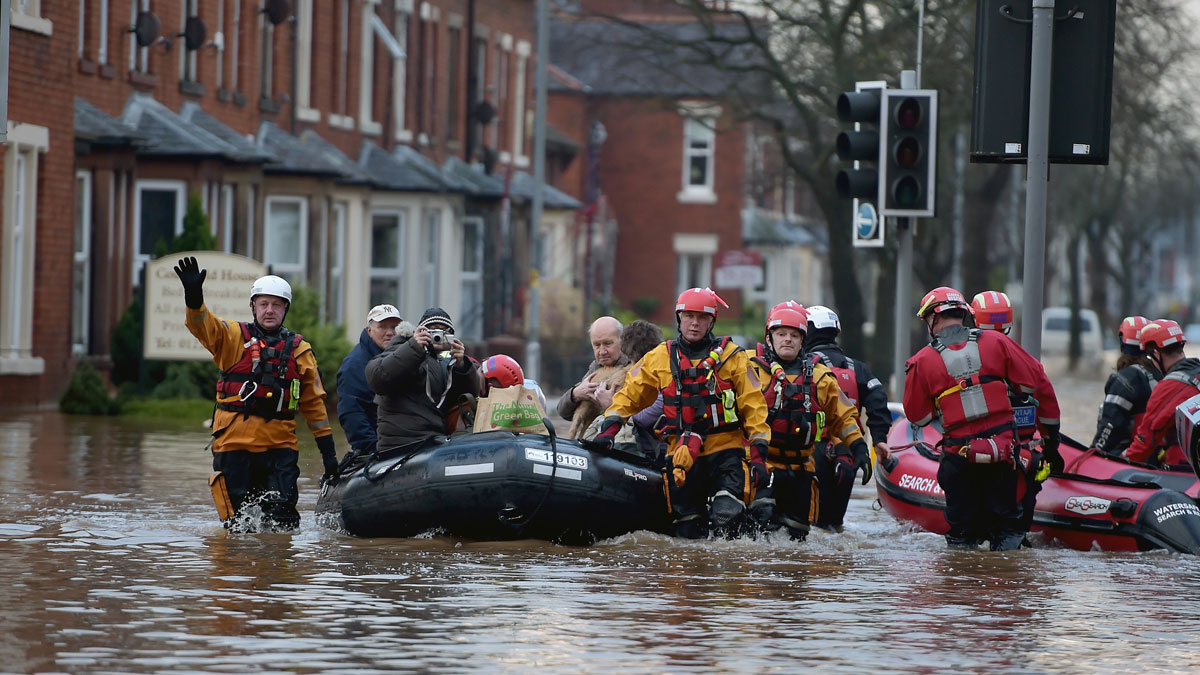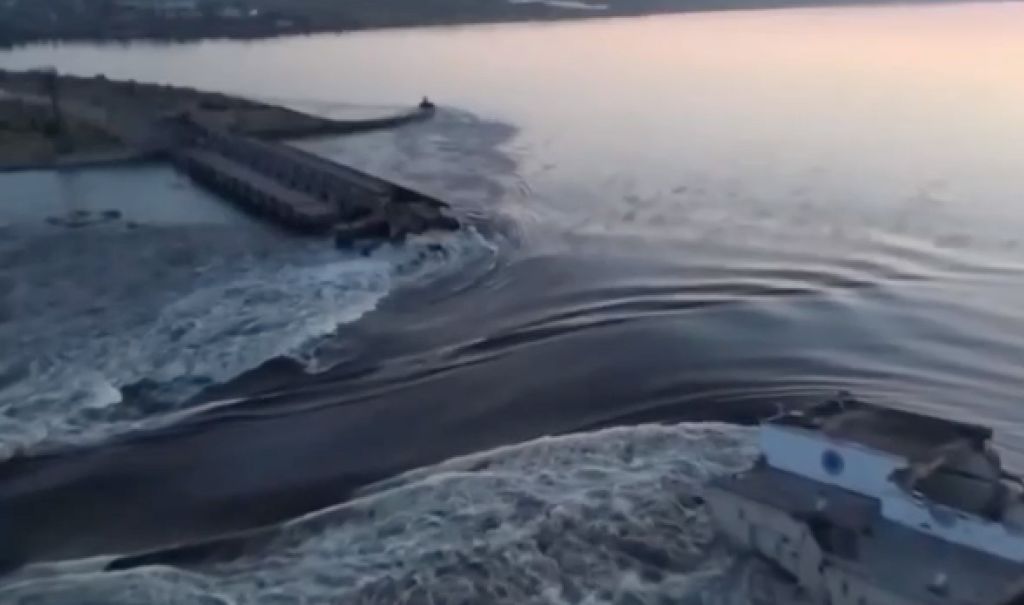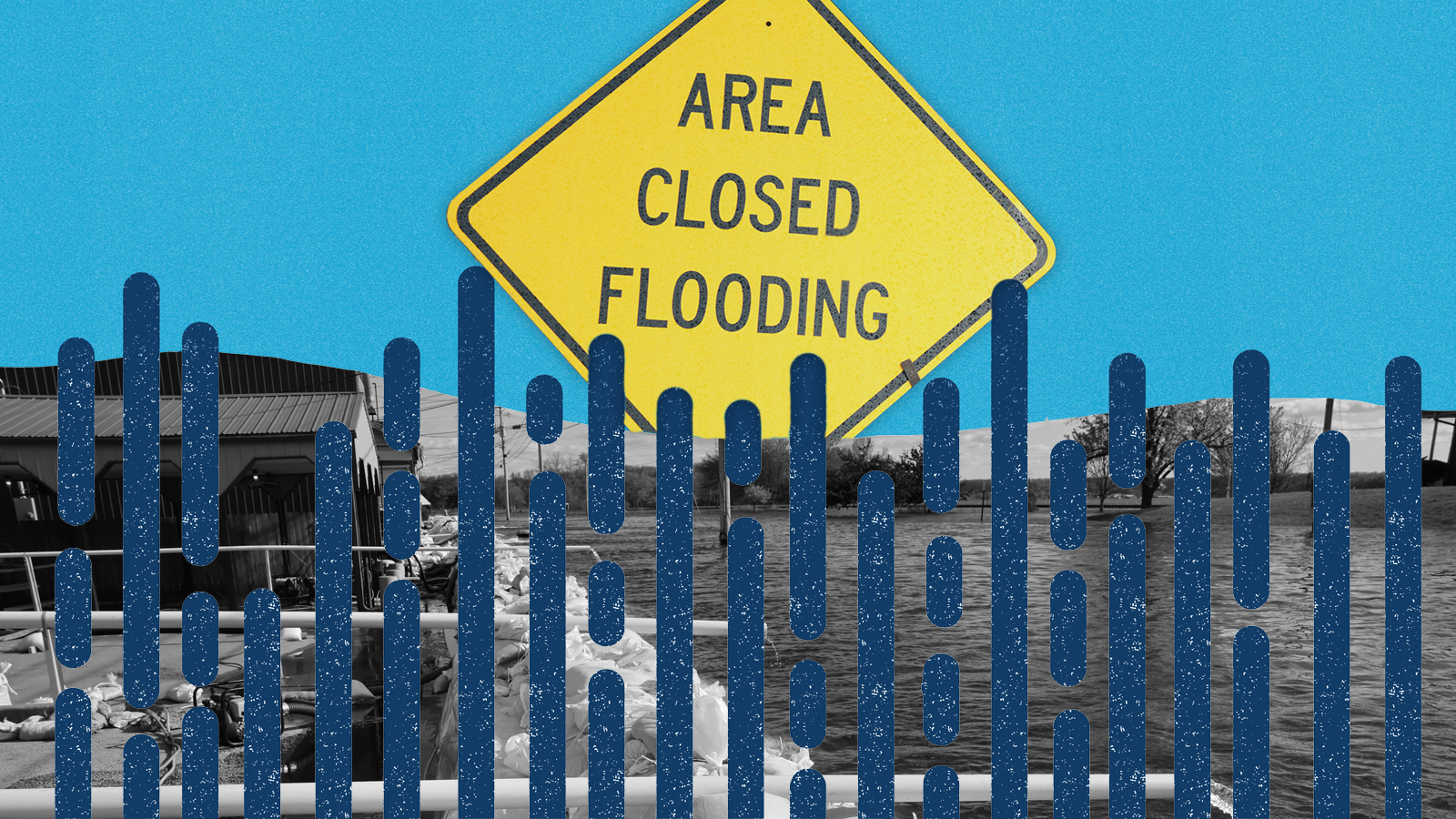Storm Desmond: is climate change to blame?
Government faces questions over cuts and failed flood defences as the clean-up operation continues

A free daily email with the biggest news stories of the day – and the best features from TheWeek.com
You are now subscribed
Your newsletter sign-up was successful
All the evidence points to climate change as a key cause of the record-breaking rainfall that sparked severe flooding last weekend, the Met Office's chief scientist Dame Julia Slingo has said.
Storm Desmond has wreaked havoc across the north of England, Scotland and Northern Ireland killing at least two people and forcing thousands to evacuate their homes.
A 90-year old man died in London after the wind blew him in front of a bus on Saturday, while a body thought to be that of an elderly man who was missing, feared drowned, was found in the swollen River Kent in Cumbria yesterday.
The Week
Escape your echo chamber. Get the facts behind the news, plus analysis from multiple perspectives.

Sign up for The Week's Free Newsletters
From our morning news briefing to a weekly Good News Newsletter, get the best of The Week delivered directly to your inbox.
From our morning news briefing to a weekly Good News Newsletter, get the best of The Week delivered directly to your inbox.
Slingo conceded that climate change was not the "definitive answer" but said that the rainfall was "seven times more likely than it would have been without human-created greenhouses gases".
Greenpeace and other environmental groups have long argued that the science is clear.
"Rising temperatures are expected to bring heavier rainfalls to the UK, which in turn are likely to increase flood risks right across the country," said Greenpeace campaigner Pat Venditti.
Others argue that more investigation is required before climate change can be cited as the cause, rather than natural variation in weather patterns. Instead the focus should be on the neglect of flood defences, they argue, with government cuts in the line of fire.
A free daily email with the biggest news stories of the day – and the best features from TheWeek.com
"Since Cameron became Prime Minister, the government has ignored one warning after another and overseen serious under-investment in flood defences," says The Guardian.
Budgets were cut by 27 per cent in 2010, the paper reports, resulting in the "failure to build 300 flood defences" when heavy summer flooding hit two years later.
David Cameron insisted that, at a certain level, rainfall is "extremely hard" to protect against, as he outlined plans to fully-reimburse councils for the costs of dealing with flooding.
As the clean-up operation gathers speed in Cumbria and the surrounding area, the UN climate summit in Paris is attempting to reach a deal to limit temperature rises to no more than 2C above pre-industrial levels - the level beyond which it is widely accepted that "dangerous" climate change will occur.
Meanwhile, another severe weather warning has been issued for later this week, with northern England, Scotland and Northern Ireland braced for further rain and flooding.
Storm Desmond: body found in River Kent, Kendal
7 December
A body has been found in the swollen River Kent, Kendal where strong winds and heavy rainfall wreaked havoc over the weekend.
Police reported that they are trying to recover the body following reports that an elderly man had fallen in the water.
Meanwhile, troops have been deployed to rescue thousands stranded by severe flooding across northern England and Scotland and emergency services continue to battle against the effects of storm Desmond, which left thousands of homes without power in Cumbria and Lancashire and forced schools and hospitals to close.
Pictures show streets where the waters are so high cars have been almost entirely submerged, after more than a month's worth of rainfall fell in just 24 hours.
More than 13 inches of rain are reported to have fallen in one day in some areas as the fourth major storm to hit the country in the past month struck. If confirmed, it will be a new British record.
On Saturday, an elderly man died in London after a gust of wind blew him in front of a bus.
Chris Missen, a volunteer for Royal National Lifeboat Institution, told The Guardian that the conditions in Cumbria were unprecedented.
He said: "It's heart-breaking to see what this has done to people's homes, especially just before Christmas ... The scale of this isn’t like anything I've seen before, it's relentless."
Disruption to key road and rail links in northwest England is likely to continue for several days. Trains on the West Coast Main Line between Preston and Scotland have been suspended, and rail replacement services cannot be offered due to treacherous conditions on the roads, says Sky News.
Prime Minister David Cameron will chair a meeting of the Cobra national emergency committee later today to coordinate the response to the crisis.
The government will inevitably come under pressure in the days ahead over whether it has done enough to prevent such severe flooding, the BBC's Carole Walker reports.
The Environment Agency has admitted that flood defences had failed to cope with unprecedented rainfall.
Stewart Young, leader of Cumbria County Council, was among those calling for an urgent investigation.
"I'll be talking to our local MPs later today and, if we need to, the Environment Agency needs to revisit them [flood defences], he said.
"That's what's going to have to happen because we can't continue to have events like this."
-
 Bad Bunny’s Super Bowl: A win for unity
Bad Bunny’s Super Bowl: A win for unityFeature The global superstar's halftime show was a celebration for everyone to enjoy
-
 Book reviews: ‘Bonfire of the Murdochs’ and ‘The Typewriter and the Guillotine’
Book reviews: ‘Bonfire of the Murdochs’ and ‘The Typewriter and the Guillotine’Feature New insights into the Murdoch family’s turmoil and a renowned journalist’s time in pre-World War II Paris
-
 Witkoff and Kushner tackle Ukraine, Iran in Geneva
Witkoff and Kushner tackle Ukraine, Iran in GenevaSpeed Read Steve Witkoff and Jared Kushner held negotiations aimed at securing a nuclear deal with Iran and an end to Russia’s war in Ukraine
-
 Glacial outburst flooding in Juneau destroys homes
Glacial outburst flooding in Juneau destroys homesSpeed Read
-
 Ukraine blames Russia for destroying major hydroelectric dam 'in panic' as counteroffensive starts
Ukraine blames Russia for destroying major hydroelectric dam 'in panic' as counteroffensive startsSpeed Read
-
 How bad are this year's Mississippi River floods?
How bad are this year's Mississippi River floods?Speed Read "Everybody's plan along the river has been put to the test"
-
 Home Office worker accused of spiking mistress’s drink with abortion drug
Home Office worker accused of spiking mistress’s drink with abortion drugSpeed Read Darren Burke had failed to convince his girlfriend to terminate pregnancy
-
 In hock to Moscow: exploring Germany’s woeful energy policy
In hock to Moscow: exploring Germany’s woeful energy policySpeed Read Don’t expect Berlin to wean itself off Russian gas any time soon
-
 Were Covid restrictions dropped too soon?
Were Covid restrictions dropped too soon?Speed Read ‘Living with Covid’ is already proving problematic – just look at the travel chaos this week
-
 Inclusive Britain: a new strategy for tackling racism in the UK
Inclusive Britain: a new strategy for tackling racism in the UKSpeed Read Government has revealed action plan setting out 74 steps that ministers will take
-
 Sandy Hook families vs. Remington: a small victory over the gunmakers
Sandy Hook families vs. Remington: a small victory over the gunmakersSpeed Read Last week the families settled a lawsuit for $73m against the manufacturer